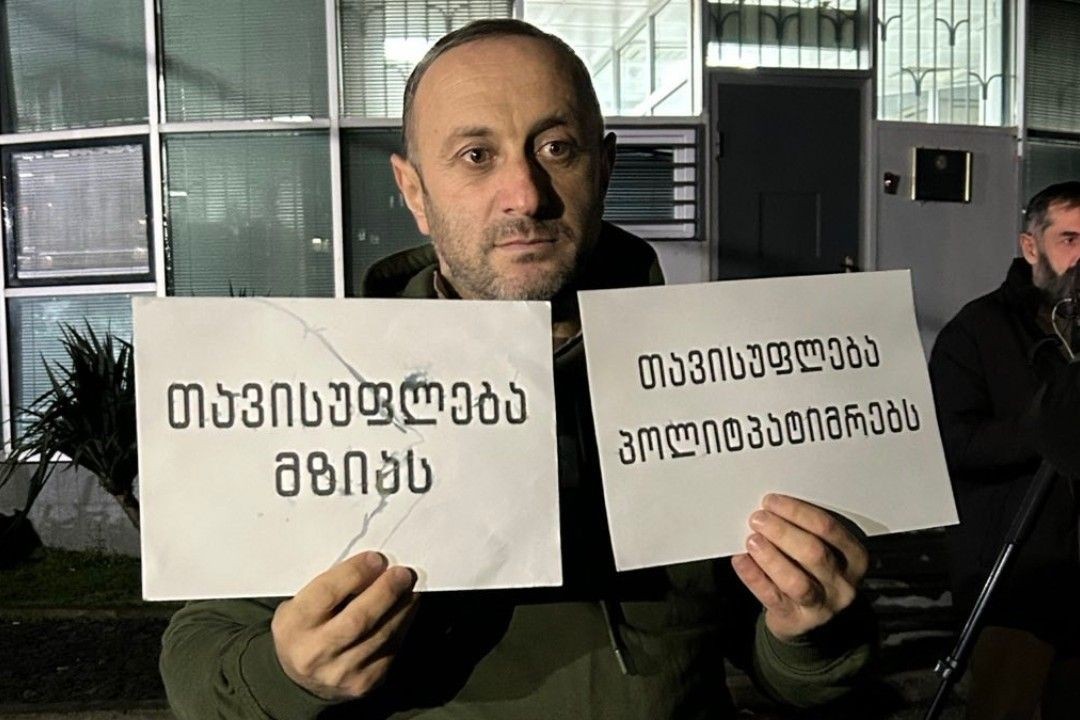
An employee at Georgian news outlet Batumelebi has accused police of breaking into and wiping footage of their actions from his phone during his arrest on charges of ‘disobeying police’.
Guram Murvanidze was arrested on 12 January during a protest outside the Constitutional Court in Batumi while filming the police detaining demonstrators with his phone. He was subsequently convicted of disobeying police and sentenced to 8 days of administrative arrest, a charge he denies.
At a press conference on Thursday following his release, Murvanidze accused the head of the Batumi police, Irakli Dgebuadze, of personally ordering his arrest after learning he worked for Batumelebi.
‘Irakli Dgebuadze turned towards me, asked who I was. I told him I was a journalist representing Batumelebi. He immediately instructed the police to check what I was recording, confiscate my phone, delete the material, and detain me’, he said.
Murvanidze’s detention came a day after the founder and director of Batumelebi, Mzia Amaghlobeli, was arrested for slapping Dgebuadze.
Murvanidze said police first took him to a police vehicle and demanded he hand over and unlock his phone, threatening to break his hands.
He said that when he was released 8 days later and retrieved his belongings, he discovered that his phone’s two-factor authentication settings had been removed and everything had been deleted, including videos and applications.
Murvanidze is being represented by the Georgian Young Lawyers’ Association (GYLA). Tamar Tsulukidze, GYLA’s local representative in Batumi, emphasised that among the deleted materials was the video from 12 January in which Murvanidze tells Dgebuadze that he is a journalist.
‘By deleting this material, not only was personal data unlawfully obtained and destroyed, but also the destruction of evidence in an administrative case took place. This video captured the conversation with Irakli Dgebuadze and the moments of the arrest’, added Tsulukidze.
The defence team had requested the video as evidence during Murvanidze’s trial, but the judge did not accept the request.
The lawyer stated that the police’s actions towards Murvanidze showed signs of several criminal offenses: unlawful interference with a journalist’s professional activities, unauthorised access to a computer system, and interference with computer data and/or computer systems. Additionally, it is considered an aggravating factor when these actions are carried out with the exploitation of a position of authority.
Murvanidze and GYLA have filed complaints with the General Inspectorate, the Prosecutor General’s Office, and the Special Investigative Service.
The case against Mzia Amaghlobeli
Murvanidze’s release came as the controversial criminal case proceeds against his boss, Batumelebi and Netgazeti director Mzia Amaghlobeli. Amaghlobeli has been charged with ‘attacking a police officer’ in a case that government critics have labelled a politically motivated attempt to suppress freedom of the press.
On 13 January, a court imposed pretrial detention against Amaghlobeli, after which she began a hunger strike. If found guilty, she faces from 4 to 7 years in prison.
Journalists and other civil society figures have organised several protests over her arrest, while several international press freedom groups have called for her release.
According to her lawyer, during and after her detention, Batumi police chief Irakli Dgebuadze treated Amaghlobeli in a humiliating manner, insulting her, spitting in her face, and denying her access to a bathroom.
During Thursday’s press conference with Murvanidze, one of the editors of Batumelebi, Nana Kvachadze, stated that the cases against Amaghlobeli and Murvanidze were not isolated but part of a ‘campaign of attack’ against Batumelebi.
Batumelebi was founded in 2001 in Batumi as an independent media outlet focused on covering human rights violations and official corruption. In 2010, Batumelebi’s founders established the Tbilisi-based news outlet Netgazeti.










